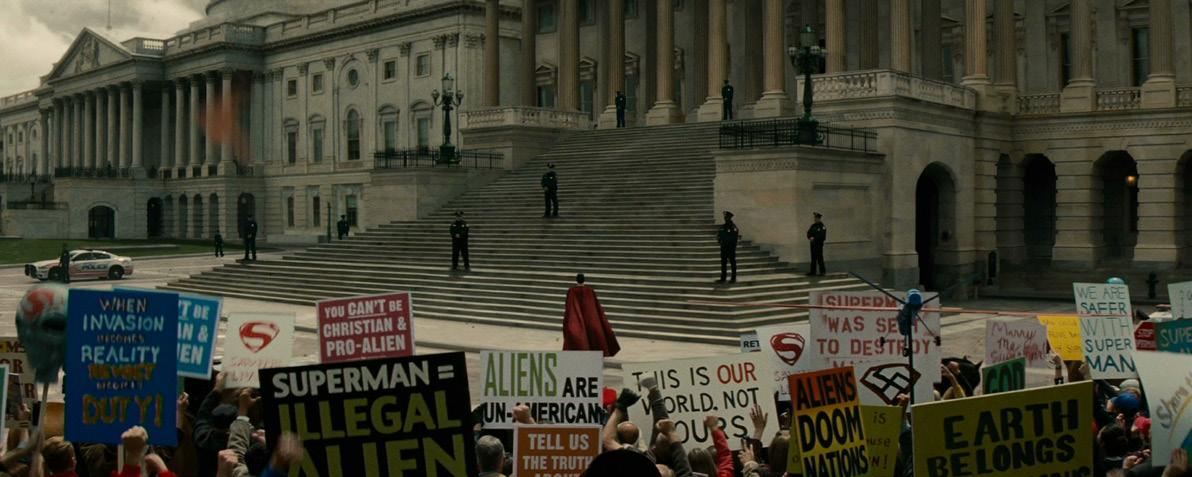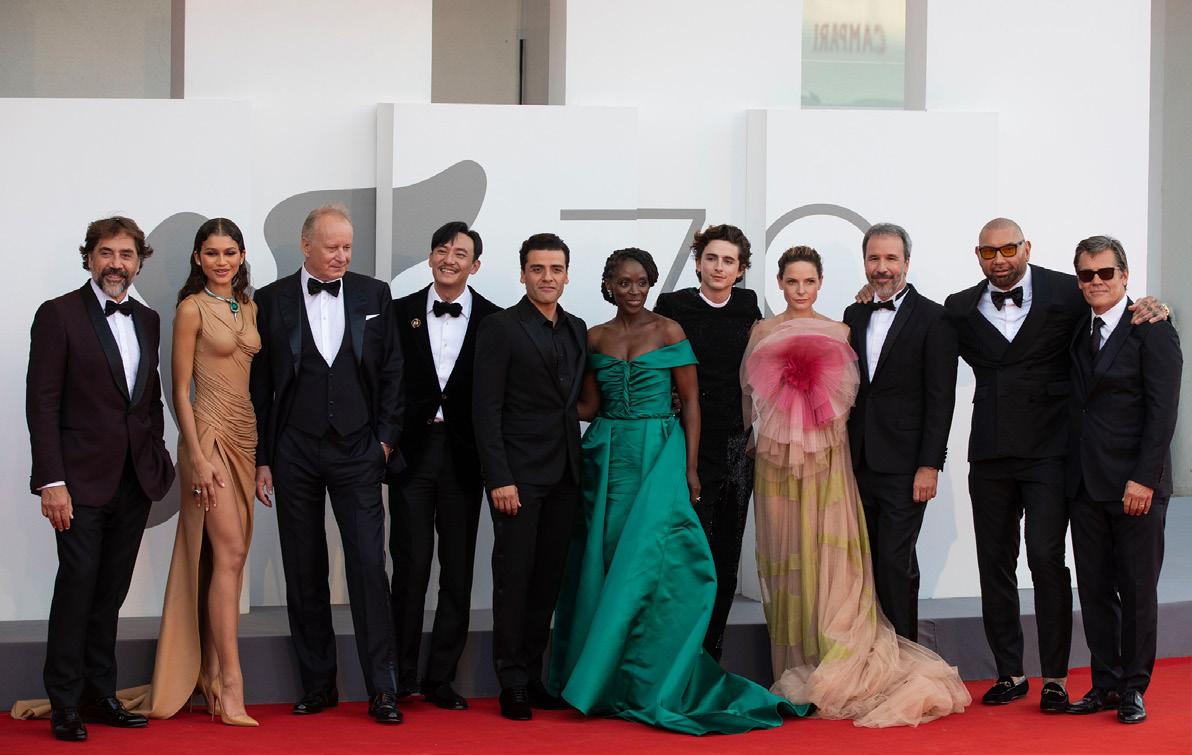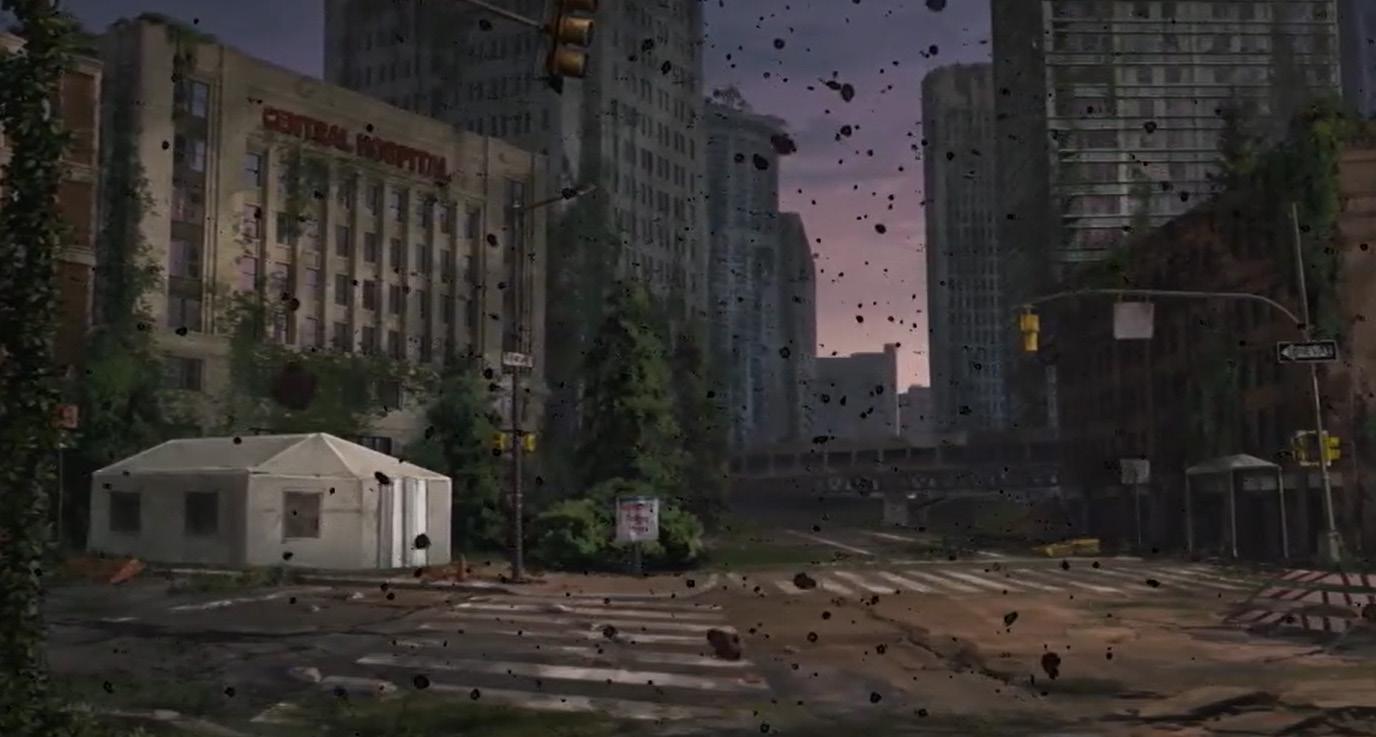
15 minute read
ARTS & CULTURE
Batman V Superman: Dividing Fans and Breaking Boundaries
An underrated gem or a bad adaptation?
Advertisement
MATTEO DI GIOVANNI Arts & Culture Editor
“Who Will Win?” The repeated question was plastered over thousands of ads during the marketing for “Batman V Superman: Dawn of Justice”. Fans of DC Comics were thrilled. For Warner Brothers, this film was intended to be an epic start to a cinematic universe by introducing Batman, Wonder Woman and the Justice League. The anticipation to see their childhood fantasies come to life was exciting. Except, once the heroes punched their way into theaters, the result was a flop amongst critics, producers and audiences alike. The audience was primarily disappointed but the film still garnered a following from passionate fans who love the ambitious comic book movie. While BvS (Batman V Superman) did set up a larger DC universe, director Zack Snyder and writer Chris Terrio had a very different type of story in mind that they set out to make.
Laurence, a fan of movies and superheroes, was disappointed when she watched BvS in theatres. She felt that the marketing and trailers dishonestly advertised the film. She shares that: “We expected an epic battle between Batman & Superman because of what was shown in the trailers. But when I saw the movie, it really wasn’t about that. The result was slow, boring and ultimately, bad”.
BvS has a different approach to the superhero movie genre. It strays away from the superhero traditions and deconstructs the characters instead. It follows an anguished Batman who breaks away from his moral codes as he tries to kill Superman, who he believes is an alien threat to humanity due to his “Otherness” and danger his power possesses. Superman, on the other hand, existentially struggles throughout the film as he becomes a target of the media and public. He also uses his Clark Kent journalistic skills to investigate how cruel Batman is towards criminals and how his bias disrupts the justice system. But, both characters are being manipulated by the psychologically complex billionaire, Lex Luthor, who tries to undermine their powers.
Initially a Dawson Cinema Communications student, Sam, didn’t enjoy the film in theatres. He states that: “It tried something new and audiences don’t respond well to new things so quickly and abruptly, especially with a title with the word “versus” in it, which promises action. That title probably sold better but didn’t fit the narrative that well”. However, when the three hour cut was released, he grew a love for it “since it fleshes out the main character’s ambitions and rivalry”, explains Sam. He also believes that the theatrical release failed because Warner Bros “chopped off essential pieces of the story to please the audience with a shorter runtime”.
Enrico, a Health Sciences Dawson student, thinks that Batman V Superman is a flawed movie. Some of his problems with the movie is that he feels it is “gratuitous”, ruined by “typical Snyder tropes and Affleck’s subpar performance as Batman” and that the “story could have been further developed”. He further explains that “the theatrical cut was a mess and a half but, I am satisfied with the changes made in the Ultimate Edition. I am overall ambivalent about the film”. He praises the film for such things as its visual beauty stating that “there are multiple moments where I can pause and gaze at the scene as if I were looking at a piece of art”. He also likes how the movie “paints Batman as an anti hero”, particularly in the scene where Clark investigates in Gotham and “experiences firsthand the citizens’ fears of Batman” and, he admires Jesse Eisenberg’s manipulative version of Lex Luthor.
Sam appreciates how BvS is character driven. “It gives more screen time to its characters. It does what comic book movies are too afraid to do, which is doing something outside the basic redundant narrative that makes every Marvel movie feel similar. Zack Snyder tried a different narrative with BvS, choosing to flesh out Kent, Luthor, and Wayne’s characters and their exchanges rather than just being a basic superhero movie”, says Sam. He continues: “The movie definitely changed my views on comic book adaptations. I respect how Zack Snyder presented these god-like heroes in the most relatable and grounded way possible. I will defend this movie because it proves how source material can be adapted and altered to any vision.”
Enrico thinks that Cavill’s performance as Superman is much more relatable than Christopher Reeve. Sam explains that BvS “humanized Superman by showing how his weakness is not only kryptonite, but his emotions too, and how that also affects the people around him”.
All in all, Batman V Superman will endlessly continue to be a subject of discourse. Hopefully over time, audiences will eventually appreciate the film’s uniquely original approach and deconstructive take on superheroes. And if you watch it, make sure it’s the 3 hour cut.
Subjectivity in Film, in Light of Denis Villeneuve’s Dune
Is a film’s popularity based on its quality, or the relevance of the cast and crew?
MEGHETY SAZIAN & ADRIAN DARWENT Contributors
Ever since the release of Denis Villeneuve’s Dune, I have had mixed feelings about the book-adapted film. My first impression of it was relatively positive, but the more I thought about it, the more questions I had. Did I like it because it was visually breathtaking, or because it stars Timothee Chalamet and Zendaya? I began to question what actually contributes to a film’s popularity and praise.
Generally, before a film’s release, the only thing we know about it is who acted in it, who directed it, and some fragments of a story line, all scavenged from the scarce details that we find thrown together in a trailer. About two months ago, I knew nothing about Dune. I am a fan of Zendaya and Timothee Chalamet, so when I heard about their roles in the movie, it immediately caught my attention. Zendaya and Chalamet became the reason I wanted to watch the film. I was not alone in this matter: People on all social media platforms started talking about the film’s release. Whether they knew anything about Dune or not, people were hyped for it. These two actors being the main characters gave the film more of a chance to be adored. In the end, fans will be biased, as they’ll generally love anything that their favourite actors are in. It gave the film some leverage towards success. But were these famous actors the only factor behind the film’s widespread praise?
I wanted to read the book and understand the Dune universe before viewing any adaptations. I quickly fell in love with it. The storytelling, the world-building, the characters, the imagery. The book was a page-turner. That’s where my speculations about Villeneuve’s Dune began to arise. I wanted Villeneuve to do the book justice, justice to the characters, to the story. I wanted to see how he would capture each moment; The reputation of that book was on the line! That gave me more than a reason to go and watch it. Pairing that with David Lynch’s adaptation, a lot of people shared the same mindset: Anything even slightly better than the previous Dune would’ve satisfied the viewers and the lovers of the book-- and that’s what Villeneuve did! Villeneuve’s Dune did not complicate the book, nor did it scare people away with the visuals. Dune’s questionable predecessor gave Villeneuve’s adaptation the social expectations it needed to succeed.
By the time I finally watched the film, others who’d watched it were already preaching about how good it was. Naturally, I came in with somewhat grand expectations. Ten minutes in, I was captivated by the sound design and gorgeous visuals. Paired with the special effects and conventionally attractive actors as the film’s protagonists, the film mesmerized me. I could not look away. I left the cinema still thinking about it and how visually beautiful it was. At that moment it was obvious to me: the film was incredible. It was incredible for reasons beyond its casting and marketability. However, it took me taking a genuine interest in the franchise and looking beyond what others had to say to figure this out.
The type of public hype for Villeneuve’s Dune can be seen surrounding the release of a lot of other films. We see people raving about them, be it because of their gorgeous cinematography, or the famous actors playing in them. As a result, we don’t always think of criticizing films ourselves, defaulting us to ‘liking’ them. My difficulty in finding out how good Dune really is comes from this overarching, inevitable bias we get from the herd mentality around interpretations of well-known movies or criticisms of art in general. You feel out of the loop when everyone praises something that you originally thought was mediocre, and it’s hard to avoid bias when social media displays similar, piggy-backing opinions of art everywhere.
Ultimately, everyone’s interests and tastes are different. The most important thing to note is to stay true to your taste. Interpret a film for what you see while watching, and don’t be afraid to use your own judgement. Remember: No film is objectively good, nor objectively bad. Subjectivity is the nature of art.

Terry DiMonte and A New Start
“Montreal’s Morning Man” exits the radio world and enters a new one.
SABBIA ELJARRAT Contributor
A man fills the frame as he sits extremely close to his laptop’s camera, wearing a cream-colored t-shirt, black square glasses and a comforting smile. He sits in a low-roofed room painted off-white and surrounded by music art pieces of the 90s. He is a vintage man, but not outdated. In fact, his latest project strengthens his modernity.
This man is no one other than “Standing By”’s co-host, Terry DiMonte.
“I was doing the same thing for so many years,” remembered DiMonte. “I’m open to learning new things and the fact that people are still interested in what Ted and I have to say is gratifying.”
DiMonte has been in the radio industry for over 30 years and had just recently dipped his toes in an opportunity that not only sparked joy, but empowered his friendship with former CHOM co-star, Ted Bird. Together, the idea born from an inside joke was brought to life - Standing By: The Terry and Ted Podcast.
Podcasting was never a life-long dream for DiMonte, but rather something that just happened. He had gotten his first job in spring of 1978 in which radio stations were owned by individuals who adored radio for radio, and not for so-called “business.” He enjoyed it so much that he had never thought of steering himself in this direction of creative freedom.
“There are no rules, do what you like,” he laughs, “creative freedom is what Ted and I enjoy the most out of this experience.”
In its simplest way, podcasting is an extension of broadcasting, and it expresses what’s current. After retirement from CHOM, he traveled for a bit and finally settled at a reminiscent studio located on Chabanel Street. His initial layout for the podcast was simply a pencil sketch, but the chemistry between these lifelong friends allowed their stories to be told in such a unique and energetic way. The first episode aired on September 8th, 2021, and marks DiMonte’s latest project.
The foundation of Standing By isn’t the content nor the early mornings, it’s the friendship. Who can record eight episodes of 45-50 minutes over a weekend? Only DiMonte can, along with Bird. “Working with Ted is what the magic is” he says proudly.
This duo had first met in 1985 at Bird’s Côte St Luc apartment sharing a Scotch. Their voices are the music to many oldschool Montrealers’ ears, and because of this, their drive for sharing their voice with the city wasn’t overlooked.
Targeted mostly for the individuals who have grown up with DiMonte in the 90s, he believes this project is open for everybody and anybody, and not strictly for the early adopters. His main goal is to make his listeners experience his personal joy for this profession and to crack a laugh with them too.

Photo VIA BELL MEDIA
Standing By’s first episode was exciting. Both DiMonte and Bird sat in a bedroom-like studio and were confused. No words were throwing up from their mouths, but this all changed as one particular conversation erupted; “how was your day?” From there, their ideas were recorded, submitted for the week and everything else came automatically.
In his third episode, he jokes about forgetting to change his top from last week because of how excited he was to continue recording. He also noted that there’s a lot of pressure that comes with being in any media industry, especially in a podcast format where there are no formal guidelines to it. While he solely approaches topics of radio nostalgia, he chooses to stay away from pop culture experiences because he wants the show to be a distraction from this tumultuous time. He will, however, briefly discuss celebrity encounters and will welcome his ex-radio pals on season 2.
Having 30 years of experience doesn’t mean there’s no time left to explore, manipulate and delve into a new hobby. Even though podcasting appears to be identical to radio, it isn’t. “I’m still learning about podcasts and what the metrics are” explains Di Monte. “Even though it looks like radio, and it smells like radio and it feels like radio, It’s not radio” he concludes.
Before starting the show, he spent some time with podcast pros and is hopeful that he will improve at adapting to this new world with optimism and empowerment.
In the meantime, Standing By is available on all streaming platforms and is free to listen to!
Cabin Fever – A Slice-Of-Life Visual Novel
CHRISTOPHER DIMITRIADIS Contributor
I’m in the middle of my second full playthrough of Cabin Fever as I’m typing this up. It’s just so incredibly good. This is the first visual novel I have ever played. And might I say, I love it. It is most definitely going up there on my favourite games list.
If you don’t know what a visual novel is, let me explain: A visual novel is a text-based story, interactive video game genre. They feature a narrative-like style of literature with sprite-based visuals. The sprites most often use an anime art style as they originate from Japan. There is one thing clear about visual novels: Your choices matter throughout the story. Make the wrong choice and you may get a bad ending.
Cabin Fever is a visual novel developed by Steamy Buns Games, a company involving some members from Sad Panda Studios. Released on July 12th, 2021, Cabin Fever is a short western styled VN that has a story that is rather appropriate to our current pandemic situation. It is set mid-pandemic, years after an unknown virus, VIVID-22, has overcome the world. It probably has a storyline that is significantly more pessimistic than our current world, which is shown through various backgrounds and dialogues throughout the novel.
The main character, whose name and voice are completely up to you, is one of those self-sufficient types who lives in the mountains and has a pretty spacious cabin upon the hills, far away from the city, filled with all kinds of off-the-grid amenities, a garden full of fresh produce and drones to deliver your online orders. No need to run into humans who may or may not have the ever-spreading virus all up in their immune systems. Everything seems to go along smooth-like until their solitary lifestyle is interrupted by the arrival of a 21-yearold woman who accidentally gets caught in one of the main character’s animal traps.
Whilst I was playing this the first time around, it made me look back to March of 2020. We were quarantined for a good few months. Barely going outside to reduce the chances of running into someone face-to-face. Which does indeed bring up a good point in how this is a direct connection to our current situation with COVID-19.
Something to keep in mind is that this visual novel was made while the artists and development team were in quarantine, just like the rest of us were. But in the case of Cabin Fever, it represents what the world would be like if COVID-19 was even more deadly than it already is.
We learn that this virus in the novel has been around for quite some time, as brought up by the protagonist in Chapter 1:
“I don’t remember much about the world before the sickness. I was just a kid when it started, too young to fully grasp all the changes happening across the globe.”
The character’s age is 20-22 years old, so to know that the sickness has been around since they were a kid is honestly something I don’t want to ever imagine happening. It was a massive shock to learn that we were entering a pandemic last year, and it is still a shock. To know that one day we could wake up and discover that COVID-19 will not be going anywhere for years is terrifying to even fathom. If that were to somehow happen, who knows what we would do?
Do we start gardens to avoid grocery stores that could be packed full of probably contagious people? Maybe we will avoid going outside as a whole and order any necessities we may need online. This nightmare comes to life in this well-written visual novel that is set in a world where the virus has made it happen.
In conclusion, Cabin Fever is a fantastic short visual novel with great voice acting, CG, an incredible soundtrack, visually pleasing character sprites and particularly, a unique art style. The soundtrack along with the diction from voice actors pulls you in and almost “plays” with your heartstrings. Lasting roughly 2-3 hours of full gameplay, it won’t take much time to get all of the endings and achievements. That being said, I feel that the brief experience is definitely worth having, one that has both lighthearted and emotional moments set in a world that is darker, but somewhat similar to our own in various ways. It is available on Steam and the Nintendo Switch.
Now, if you don’t mind, I will now go back to finish off my second playthrough of my new favourite game, Cabin Fever.








